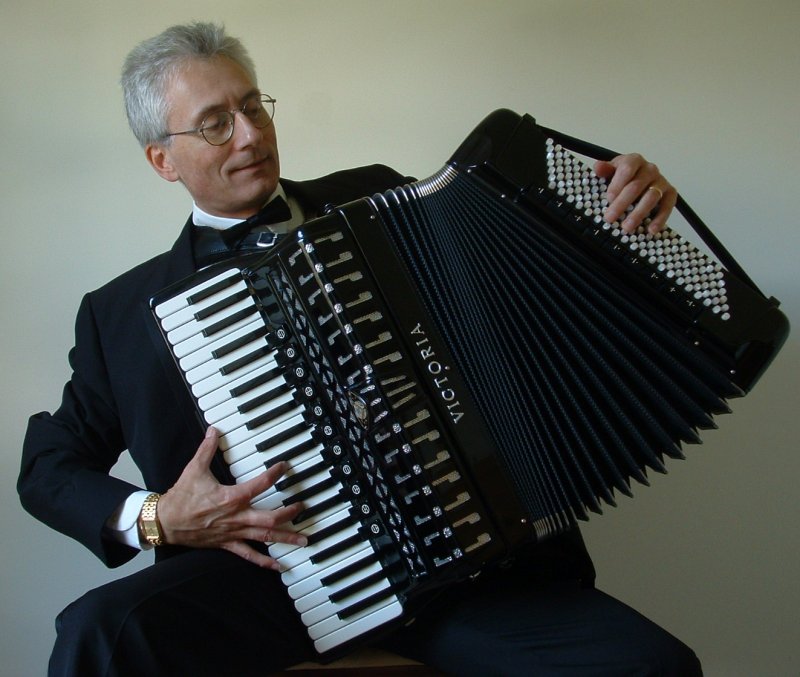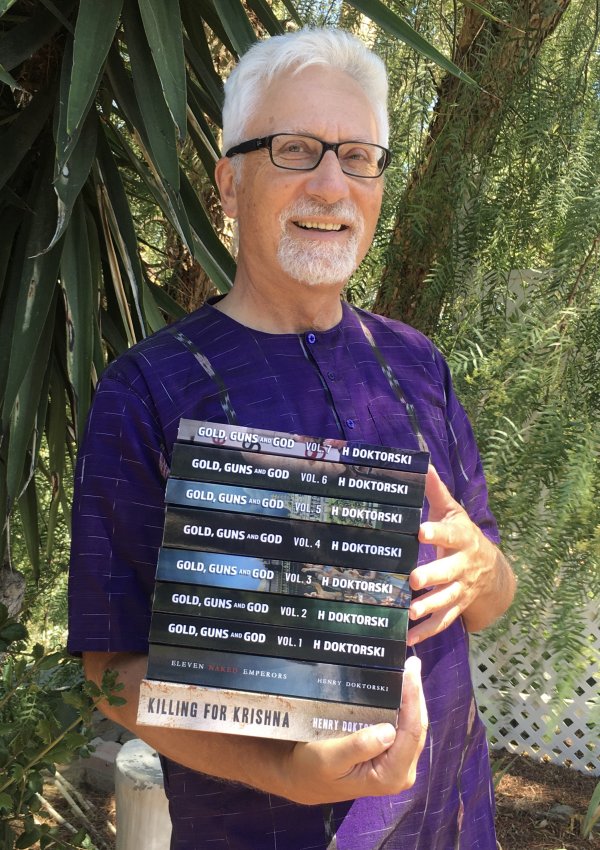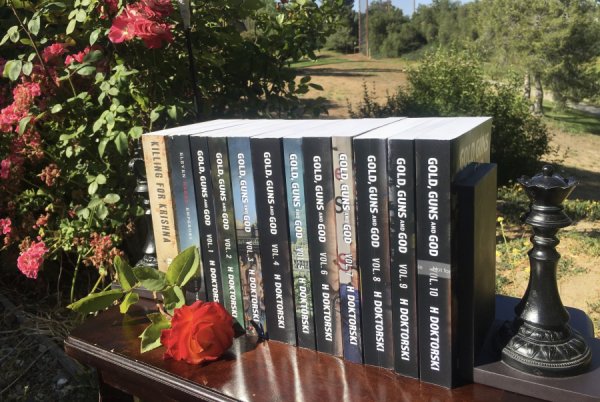Author
“This magnificent volume is the culmination of more than five years of scholarly research.”—Jay Landers, from the Accordions USA review of Henry’s book: The Complete Works of Guido Deiro (Mel Bay Publications: 2008)

Henry Doktorski: 2015 Portrait.
If there is one thing Henry enjoys as much as composing, rehearsing, conducting, and performing music, it is conducting research, gaining knowledge about topics dear to his heart, organizing his thoughts and typing them into a Microsoft Word document, and sharing that knowledge with others. Whether this work takes the form of letters to newspaper editors, articles for publication in print or online magazines, or non-fiction books for academics or the general public, he writes with cohesiveness and attention to detail. Henry’s books and articles have been published by
• City University of New York (CUNY) Press
• State University of New York (SUNY) Press
• Harwood Academic Publishers (London)
• Duquesne University School of Music (Pittsburgh)
• Mel Bay Publications (Missouri)
• Santorella Publications (Massachusetts)
• The Classical Free-Reed, Inc. (Online Publication)
• Accordions USA (Online Publication)
• New Music Box (Online Publication)
Henry’s articles and letters have appeared in diverse venues ranging from the scholarly Duquesne University music journal, Music Theory: Explorations and Applications, to the trendy pop music magazine Rolling Stone; from the New-Age journal, Uzubuh, to the Danish accordion magazine, Harmonikacentret; from The Pittsburgh Catholic, to Playboy, and USA Today.

Publicity Photo (2003)
As can be expected, much of Henry’s writing has been about music, and especially about the accordion—an instrument dear to his heart. A few of his more significant literary works are:
• “The Accordion In American Music and Culture” (2010), a 1,000-word reference article, published in the five-volume Encyclopedia of American Music and Culture, by ABC-CLIO—an award-winning publisher of reference, contemporary thought and professional development content.
• The Complete Works of Guido Deiro (2008), a 192-page book, published by Mel Bay Publications.
• How to Play Diatonic Button Accordion, three volumes (2007-2011), published by Santorella Publications.
• CD booklet notes for The Complete Recorded Works of Guido Deiro, four volumes (2007-2010), by Archeophone Records.
• The Brothers Deiro and Their Accordions (2005), lauded as the first biography of the two pioneer vaudeville accordionists: Guido and Pietro Deiro, published by The Classical Free-Reed, Inc.
• Accordion Registrations (2005), published by New Music Box.
• The Accordionist as Accompanist, (2005), published by AccordionsUSA.
• CD booklet notes for Vaudeville Accordion Classics (2003), by Bridge Records.
• “Guido Deiro: Polca Variata/Variety Polka” (2002), The Free-Reed Journal, Volume 4—a publication of the Center for the Study of Free-Reed Instruments at The Graduate Center of The City University of New York.
• The Classical Squeezebox: A Short History of the Accordion in Classical Music (1998)—a pioneering 44-page scholarly research work, published by the British international journal, Musical Performance.
• “The Accordion and Gershwin’s Rhapsody In Blue: A Historical Perspective” (1999), Music Theory: Explorations and Applications, Volume 7 (Duquesne University School of Music).
• “The Composer: An Endangered Species—An Interview with David Stock” (1995), Music Theory: Explorations and Applications, Volume 4 (Duquesne University School of Music).
• 184 CD and concert reviews, and dozens of articles (1993-2011), which can be accessed from The Classical Free-Reed, Inc. website.

Henry at the 1989 Schlicker two-manual and pedal organ at House of Prayer Lutheran Church, Escondido.
In addition to the accordion, Henry likes to write about another musical instrument dear to his heart: the pipe organ (and sacred music). His 43-page book (which includes a 31-minute, 15-track compact disc), Anatomy of an Organ: The Schlicker Two-Manual and Pedal Organ at House of Prayer Lutheran Church, Escondido, California (2017), was published by House of Prayer Lutheran Church and received excellent reviews. During his ten-year tenure as director of music at Grace Lutheran Church (Rochester, Pennsylvania), he wrote 25 essays which were published in the church’s monthly journal, Grace Visitor:

Henry has completed twelve books on Hare Krishna history (photo: August 5, 2022).
Killing for Krishna—The Danger of Deranged Devotion by Henry Doktorski is a nuanced, intelligent, and impeccably researched work on events and developments which continue to haunt ISKCON to this very day. The author writes from a unique perspective: he has methodically studied the Keith Gordon Ham/Swami Bhaktipada Archive for fifteen years, and as a former inhabitant of the New Vrindaban Community, he is both personal witness and chronologist of most of the events described in this book. Additionally, and in contrast to former accounts of the decline of the New Vrindaban Community, Doktorski refrains from oversimplifying an inherently complex narrative. Rather, he acknowledges ambiguity where appropriate and clarity where it is possible. The outcome, then, is an extremely well written, and important and timely work—and while it is foreseeable that its publication may not be welcome by everyone within ISKCON, one would hope that it nonetheless will be instrumental in opening an honest and unbiased reflection within a movement which so far has been somewhat reluctant to meet up to its past and responsibility.
—Professor Dr. Alexander Batthyany, the Viktor Frankl Chair for Philosophy and Psychology at the International Academy of Philosophy in the Principality of Liechtenstein
Eleven Naked Emperors is quite masterful, and extremely important. The story is a long and complicated one, but Doktorski has done an outstanding job putting the entire drama into a very well documented and highly readable account. His tone is remarkably non-partisan, non-polemical and he has tried sincerely to be fair and impartial. I might add, for those who feel that dirty laundry should not be displayed in public, that there is nothing in Doktorski’s work that seeks to undermine the faith of the devotees in Krishna or, for that matter, in the institution of ISKCON. Those assuming the role of gurus, most especially, should read this book carefully. And this is also a book for the tens of thousands of devotees driven away from ISKCON with their spiritual ideals in tatters; this is their story too. The author has risen to the dharma of the historian in documenting a defining period in the history of the Hare Krishna movement.
Edwin Bryant
Professor of Hindu Philosophy and Religion
Rutgers University
Henry Doktorski’s Gold, Guns and God series represents an exhaustive compendium of information about one of the most compelling stories of the late 20th century: the meteoric rise and gradual decline of the Hare Krishna movement in America and elsewhere around the globe, but especially at the West Virginia New Vrindaban community.
Rather than a concise summary, these books draw on literally all existing sources of information about the Hare Krishnas, including the voluminous personal archives of Swami Bhaktipada himself. Personal reminiscence and oral history is another significant source. Doktorski himself was a devotee at New Vrindaban for more than a decade and a half. His personal experiences and observations are compelling testimony, as well as those of fellow devotees (some) with whom he interacted for more than four decades.
It is a story of absolute power corrupting absolutely.
John A. Cuthbert, Director and Curator
West Virginia and Regional History Center
West Virginia University
Morgantown, West Virginia
Although much of Henry’s literary works explore musical themes (especially regarding the history and performance practice of the accordion), a good deal of it deals with topics regarding the Hare Krishna movement, as he dedicated nearly 16 years of his life to serving ISKCON as a disciple of His Divine Grace Kirtanananda Swami Bhaktipada. Henry’s first article in this genre was published in 1982 in Brijabasi Spirit: The Journal of the New Vrindaban Community. Since then he has had dozens of articles published in that journal, as recently as 2015, as well as in the independent Vaishnava daily: The Sampradaya Sun. Some of Henry’s thoughts about his time with the Hare Krishnas can be found at New Vrindaban: The Black Sheep of ISKCON.
Henry’s writings about the Hare Krishna movement have also been published in academia:
• “Guru Authority, Religious Innovation, and the Decline of New Vrindaban,”—a chapter in the book, Homegrown Gurus: From Hinduism in America to American Hinduism (SUNY Press: 2013), co-written with E. Burke Rochford, Jr.
Perhaps Henry is best known for his twelve non-fiction books about Hare Krishna history (plus foreign language editions):
• Killing for Krishna: The Danger of Deranged Devotion—the story of the conspiracy to murder the New Vrindaban resident and devotee dissident Steven Bryant/Sulochan dasa (January 2018)
• Eleven Naked Emperors: The Crisis of Charismatic Succession in the Hare Krishna Movement (1977-1987)—a history of the zonal acharya era of ISKCON (January 2020)
• The Disastrous Decade: The Zonal Acharya Era of ISKCON (1977-1987)—an abridged version of Eleven Naked Emperors (November 2025)
• Gold, Guns and God: Swami Bhaktipada and the West Virginia Hare Krishnas—a ten-volume, 108 chapter biography of Kirtanananda Swami and a history of the New Vrindaban Community, which includes the following ten volumes:
• Gold, Guns and God: Vol. 1 —“A Crazy Man” (December 2020)
• Gold, Guns and God: Vol. 2 —“A Pioneer Community” (March 2021)
• Gold, Guns and God: Vol. 3 —“Prabhupada’s Palace of Gold” (October 2020)
• Gold, Guns and God: Vol. 4 —“Deviations in the Dhama” (November 2021)
• Gold, Guns and God: Vol. 5 —“The Murder and the Mandir” (November 2020)
• Gold, Guns and God: Vol. 6 —“The Guru Business” (June 2022)
• Gold, Guns and God: Vol. 7 —“Trials and Tribulations” (July 2022)
• Gold, Guns and God: Vol. 8 —“The City of God” (November 2022)
• Gold, Guns and God: Vol. 9 —“Pushed Out Completely” (February 2023)
• Gold, Guns and God: Vol. 10 —“The Final Pastimes” (June 2023)
• Sicarios Por Krishna: El Peligro de la Devoción Desquiciada—a Spanish edition of Killing For Krishna (August 2019)
• Uccidere Per Krishna: Il Pericolo di una Devozión Squilibrata—an Italian edition of Killing For Krishna (March 2021)
• Oro, Pistole e Dio: Vol. 1—an Italian edition of Gold, Guns and God, Vol. 1 (May 2024)

To date, Henry has completed twelve books on Hare Krishna history.
In addition, Henry wrote the Foreword to the 2024 book by Kailasa Chandra dasa: On Consciousness & The Perfection of Man.
Henry also promotes other authors, such as Ekkerhard Lorenz who wrote:
• Race, Monarchy, and Gender: Bhaktivedanta Swami’s Social Experiment.
Willem Vandenberg (Varnadi das) who wrote:
• From Master To Disciple: The Disciplic Succession That Never Was
And Bhaktavasya devi dasi who wrote:
And Kaliya Mardana dasa Brahmachari who wrote:
• The Journey Home Debunked: Exposing Mayavada Infiltration into Shrila Prabhupada’s Family.
In addition to topics on music and the Hare Krishnas, Henry is keenly interested in philosophy and history, and is an admirer of the Israeli historian Yuval Noah Harari, the author of Sapiens: A Brief History of Humankind, an international best seller which has been translated into 30 languages. From time to time, Henry writes essays on topics which he considers important. Two recent additions to his blog include:
• Our Hunter-Gatherer Ancestors: In Balance With the Earth?
• A Brief Comparison of the Code of Hammurabi and the Declaration of Independence.
For more, see Henry’s Bibliography.
| Back to The Homepage of Henry Doktorski |